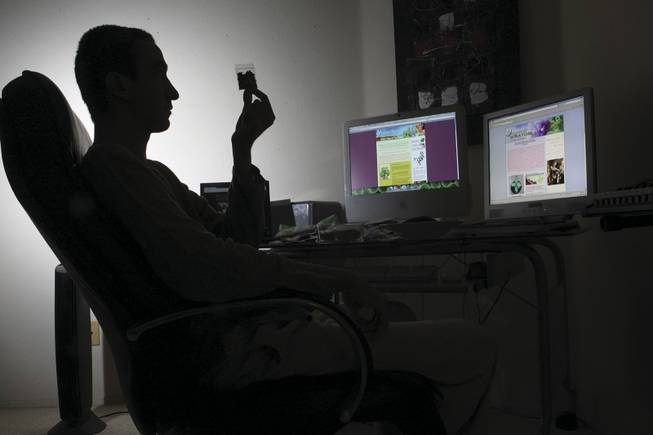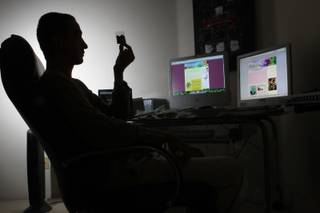
Al Grand, 30, shown in silhouette to protect his privacy, holds a packet of Salvia divinorum, the hallucinogenic drug he sells on the Internet and ships legally from his home. Some scientists want to keep it from being classified as an illicit drug because it might be used to treat pain, addiction and brain disorders.
Tuesday, April 7, 2009 | 2 a.m.
Sun editorial
- Editorial: This plant is no party drug (4-14-06)
Beyond the Sun
In 2006 travel agent Al Grand decided to focus on a new career: selling hallucinogens.
Now, from his quiet home in North Las Vegas, the 30-year-old ships little plastic bags across the country. He imports his product from Mexico, accepts credit cards and reports an $80,000 annual income, collected one gram at a time.
None of this is illegal. Not yet.
Grand sells Salvia divinorum, a psychoactive herb that’s wildly controversial — and almost totally unstudied. Since 2005 more than a dozen states have outlawed its sale, use or possession. And though no Nevada politician has moved to follow those examples, the nationwide trend has scientists worried that criminalization of salvia will prevent realization of its medical potential.
Yes, salvia gets you high. But someday it might also make you well. And so far, not one study has been published indicating that salvia is addictive or particularly harmful.
John Mendelson, a California pharmacologist, is one of several scientists studying the plant’s psychotropic extract.
“The big news here is how little we know,” Mendelson said.
Mendelson and fellow scientists say salvia appears to have the potential to treat pain, addiction, depression and brain disorders — unless it is classified as an illicit drug.
In that case, scientists fear, research would be rendered almost impossible — not just because testing illicit drugs is a complicated process of obtaining government permissions, but because drug developers usually aren’t eager to sink millions into illegal narcotics.
Mendelson says go ahead and regulate salvia, prohibit its use by minors, but don’t flatly outlaw it.
That, he said, would “create illicit commerce where it doesn’t exist now, which would be really, really stupid.”
If the controversy over salvia can be traced back to one source, it would be the 2006 suicide of Delaware teen Brett Chidester. In journals discovered after his death, the 17-year-old had written about how salvia led him to believe “existence in general is pointless.” His parents cite this as evidence that salvia prompted the suicide. Several months after the teen died, a medical examiner changed his death certificate to include salvia as a contributing cause even though salvinorin A, salvia’s psychotropic compound, was not found in Chidester’s system. That medical examiner has never publicly discussed her decision, but that hasn’t prevented the media from having a field day with Chidester’s death.
News stories about salvia almost always lean on the Chidester suicide to suggest the herb is dangerous — not just because it’s a dramatic and ghastly story but because it is the only story of its type.
A federal study conducted in 2008 found that roughly 1.8 million people had tried salvia, and yet Chidester’s is the only death that has ever been linked by a medical professional to the hallucinogen. And though many consider that connection highly speculative, less than a year after Chidester died, Delaware legislators passed a law named after the teen that made the use of salvia a misdemeanor. Today, 14 states ban the use of salvia across the board, and California and Maine have passed laws aimed at keeping salvia away from minors.
In part because of a campaign led by Chidester’s mother, who wants salvia outlawed nationwide, salvia continues to get plenty of press: “legal, maybe lethal,” “deadly dangers of a street legal high,” “cheap, legal and dangerous,” “parents blame exotic plant for son’s suicide.”
Hysteria headlines have helped fuel the war against salvia. But they also boost sales. On a typical day, Grand says, he sells about 10 one-gram bags of salvia, which looks like something out of the spice cabinet: a dry, dark green botanical. But when the media report about the dangers salvia, traffic to his Web site — salviasociety.org — soars with his sales. On Thursday night, for example, Fox News ran a national story on salvia. On Friday morning Grand had more than 60 orders in white envelopes, stamped and ready for delivery.
He charges $30 for a gram of his most potent extraction, and says that’s enough to get high 30 times. But the truth is, few people report using salvia 30 times, or five times even. This is another underreported fact: The high can be fairly unpleasant, or at least so powerful that it’s overwhelming. This is partly why, in 2003, a Drug Enforcement Administration bulletin on salvia concluded it was unlikely to become the next cool club drug. “Numerous individuals report experiencing negative effects during their first experience with Salvia divinorum and indicate that they would not use it a second time,” the bulletin noted. “Some others report that the drug caused them to become introverted and sometimes unable to communicate clearly.”
The high, which seldom lasts more than 15 to 20 minutes, is said to be as intense as it is brief: out-of-body feelings, a sense of moving through time and space and of merging with inanimate objects. The easiest way to observe the effects of salvia is via YouTube, where thousands of users have posted videos of themselves after ingesting the herb, usually by smoking it.
These videos are another hurdle for salvia’s supporters, who have watched politicians make hay of the taped hallucinations. Most of these videos feature teens — and teens rolling around on the carpet do not make a great case for a product Grand and many other sellers market as mind-expanding and shamanistic. This is why Grand would like to see minors prohibited from using salvia. He’d also like to see sellers who market salvia as a street drug put out of business.
Grand is hardly Nevada’s only salvia seller. One company, which sells the herb under the brand name “Purple Sticky” and is considered one of the biggest salvia retailers in the country, is based in Henderson. Company officials did not respond to the Sun’s interview requests.
Because salvia isn’t illegal, its sale isn’t tracked, but in addition to being available over the Internet, it can be purchased in local smoke shops. At Diversity Tattoo, which has several Clark County locations, customers can choose from four different potencies of salvia. At Diversity’s Las Vegas Boulevard store, sales associate Vance Bates says he sells three packets of salvia a day at most, usually to tourists. At Diversity’s Maryland Parkway store, near UNLV, a sales associate says salvia hardly sells at all; the students who make up the shop’s clientele just aren’t interested.
Grand figures less than 1 percent of his sales are to Nevada residents. He has shipped salvia across the globe, but says most of his clients come from California and Texas.
At WestCare, a private facility that contracts with local governments to provide drug treatment, employees who register new patients say they’ve never heard of salvia, and don’t screen for it.
In the high school health classes that Metro narcotics detective Bruce Gentner visits several times a month for drug awareness presentations, students are increasingly asking about salvia, wondering whether it’s dangerous, whether the high is an intense as their friends say, whether it’s really legal. Gentner and his partner advise students not to take the hallucinogen. They also think YouTube videos featuring unpleasant and scary salvia highs work to dissuade curious teens.
The DEA calls salvia a “drug of concern,” and has been researching the botanical for some time, local DEA chief Mike Flannagan said. By some accounts, the DEA has kept an eye on salvia for a decade — ever since someone came up with a way to extract salvinorin A, which allowed manufacturers to fabricate a more potent product and, in turn, fueled the wider recreational market we see today.
In its plant form, salvia has been used for years in Mazatec shaman rituals in Oaxaca, Mexico. Scientists believe salvia could have medical value because it interacts with the brain in a novel way, Mendelson says. Other psychotropic substances flood several different brain receptors, but salvinorin targets just one.
“We have never had botanically available compounds that work in this way,” he said. “Medical chemists are going wild with these compounds, trying to do new things with them.”
An Iowa researcher has suggested salvia can be used to treat other drug addictions, namely because lab rats given access to cocaine will stop using the illegal drug if offered salvinorin instead. Another researcher has suggested salvia could be used to treat Alzheimer’s or even HIV because of its particular brain interactions.
Mendelson has done only one salvia study with human subjects, and it didn’t yield much data.
The problem was the salvia high was over so quickly he and fellow researchers couldn’t really study it — they ran out of time to collect the data.



Join the Discussion:
Check this out for a full explanation of our conversion to the LiveFyre commenting system and instructions on how to sign up for an account.
Full comments policy